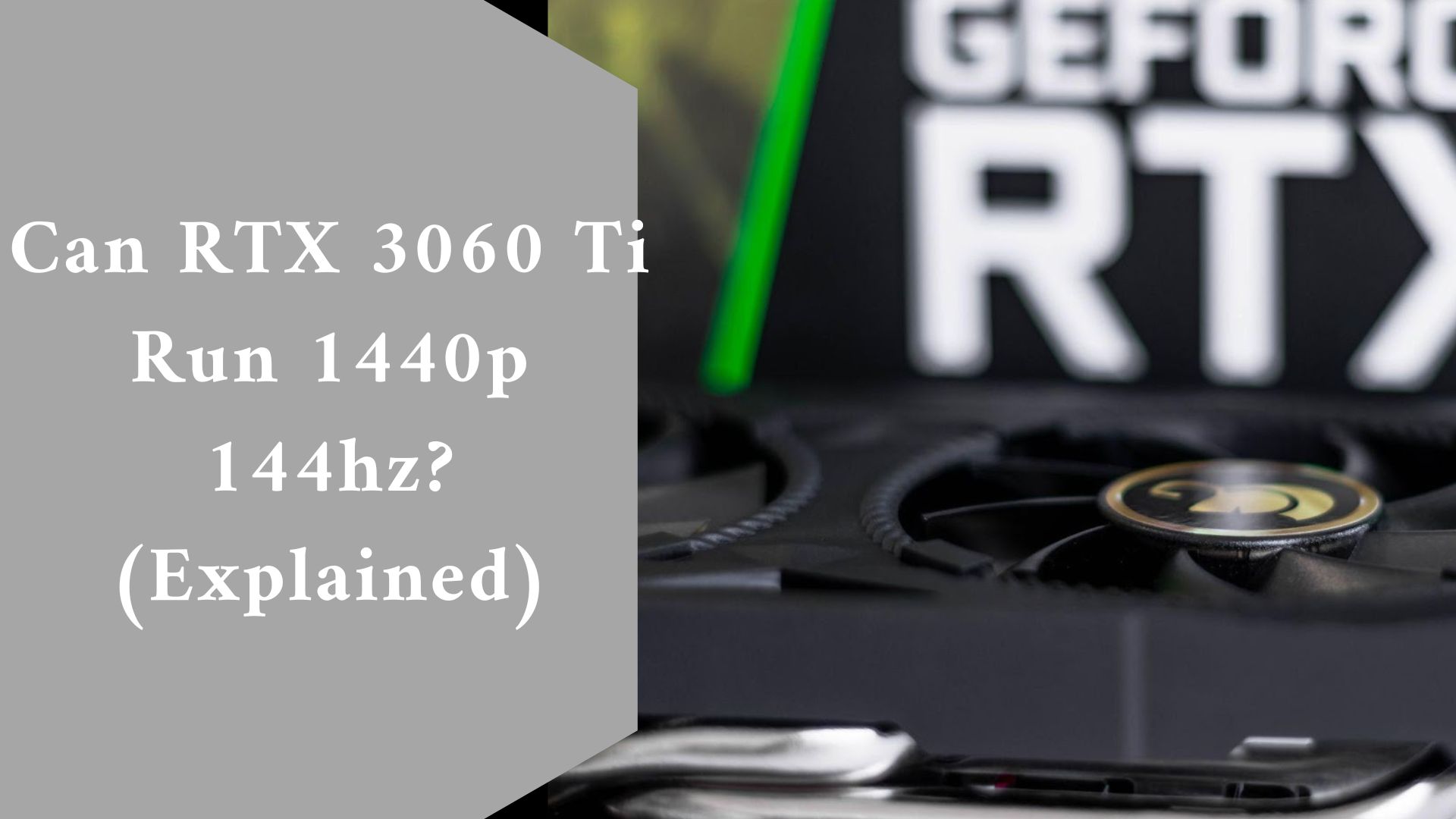Yes, the RTX 3060 Ti performs admirably in 1440p 144 Hz mode. At this resolution, the GPU offers 60 – 80 FPS, which is adequate. These FPS are at the highest game settings. Even more, FPS can be obtained by lowering the settings a little too far.
Review of the Nvidia GeForce RTX 3060 Ti
Nvidia’s new RTX 3060 Ti graphics card is an unexpected addition to the company’s RTX 3000-series lineup.
It will be available tomorrow for $399 and will outperform the previous-generation top-of-the-line RTX 2080 and 2080 Super, according to Nvidia.
However, the 3060 Ti is far from the top of the range; in fact, it is the most affordable RTX card available. If the RTX 3070 was the sweet spot for 1440p gaming, the RTX 3060 Ti appears to be an even sweeter location due to the additional $100 savings.
The RTX 3060 Ti, like the RTX 3070, can handle 4K gaming if you’re prepared to lower the settings, but both cards are primarily aimed at the 1440p market.
The 3060 Ti is another wonderful option if you want to upgrade from a 1080p monitor to a 1440p panel without paying $699 for the RTX 3080 or dealing with the additional power requirements and power drain.
I’ve spent the last week testing the new RTX 3060 Ti at 1440p and 4K resolutions ahead of its December 2nd release.
This card, like the RTX 3070, has plenty of headroom at 1440p or below, but it fails to hit 60fps in some recent games at 4K. Nonetheless, the RTX 3060 Ti’s performance has amazed me, especially for $399.
Hardware
The RTX 3060 Ti appears to be nearly identical to the RTX 3070. The size and shape are the same, as is the usual dual-fan configuration.
The dual-axial fans cooperate to keep the card cool, with the right fan pushing air through the card to the opposite side and the left directly cooling the GPU cores with air that may exhaust out the back of your chassis.
While a result, the RTX 3060 Ti is a quiet card, and I hardly heard the fans spin up as it reached temperatures of 73 degrees Celsius in most games I tried.
The RTX 3060 Ti, like the RTX 3070, has a thick and compact PCB designed to enhance airflow across the board. Instead of the standard 6- or 8-pin power connectors, Nvidia is employing its unique 12-pin power connector.
Inside the box is an adaptor that must be used. The RTX 3060 Ti requires only one 8-pin connection adapter, therefore the setup isn’t as large as the RTX 3080 adaptor. I’d still recommend getting a specific 12-pin port from your power supply manufacturer to avoid using this hideous converter.
In addition, the RTX 3060 Ti has a single HDMI 2.1 connector and three DisplayPort 1.4a ports. Nvidia has removed the USB-C VirtualLink port featured in the RTX 2000 series, as well as the rest of the RTX 3000 series.
The card, like the RTX 3070, has GeForce RTX branding on the side, however, it does not light up when your PC is powered on.
The biggest cosmetic distinction between the two cards is that Nvidia uses a somewhat lighter silver coating on the 3060 Ti. It differs from the darker silver seen on the other RTX 3000 series cards, and I like the darker version.
The power needs for Nvidia’s RTX 3000 series cards have all been increased, but the RTX 3060 Ti is a little more modest.
The Nvidia RTX 3060 Ti requires a 600W power supply and can demand up to 200 watts. For comparable performance, this is only 15 watts more than the RTX 2060 Super and 50 watts less than the RTX 2080 Super.
1440p testing
I’ve been running the RTX 3060 Ti through its paces on a PC powered by Intel’s newest Core i9-10900K processor.
I connected the RTX 3060 Ti to a 27-inch Asus ROG Swift PG279Q monitor for 1440p tests. This monitor has a refresh rate of up to 165Hz with G-Sync, making it a good 1440p alternative for pushing the 3060 Ti’s boundaries. I’ve also been experimenting with the 4K performance, which you can see here.
I’ve been playing several games to put the RTX 3060 Ti to the test, and the results at 1440p are impressive. Shadow of the Tomb Raider can maintain 100fps at maximum settings, and Call of Duty: Warzone can maintain 119fps even with ray-traced shadows enabled.
Oven Control, a generally challenging videogame, manages to exceed 60 frames per second. Watch Dogs: Legion and Metro Exodus are the only exceptions.
To compensate for the performance decreases in both titles, activate DLSS or disable some of the graphic settings. I’m less concerned about Watch Dogs just missing the magical 60 frames per second, especially when Control performs so admirably.
RTX 3060 Ti (1440P)
| Benchmark | RTX 3060 Ti | RTX 3070 | RTX 2080 |
|---|---|---|---|
| Microsoft Flight Simulator | 20fps | 40fps | 35fps |
| Shadow of the Tomb Raider | 103fps | 111fps | 87fps |
| Shadow of the Tomb Raider (DLSS) | 108fps | 118fps | 97fps |
| CoD: Warzone | 120fps | 130fps | 97fps |
| CoD: Warzone (RT) | 119fps | 126fps | 92fps |
| Fortnite | 134fps | 139fps | 102fps |
| Fortnite (DLSS quality) | 188fps | 173fps | 138fps |
| Fortnite (DLSS perf) | 219fps | 214fps | 153fps |
| Gears 5 | 123fps | 114fps | 85fps |
| Death Stranding | 132fps | 134fps | 114fps |
| Death Stranding (DLSS quality) | 158fps | 166fps | 141fps |
| Death Stranding (DLSS perf) | 171fps | 172fps | 184fps |
| Control | 87fps | 95fps | 78fps |
| Control (DLSS quality + RT) | 91fps | 94fps | 76fps |
| Control (RT) | 54fps | 57fps | 46fps |
| Control (DLSS quality) | 131fps | 140fps | 114fps |
| Metro Exodus | 39fps | 44fps | 35fps |
| Metro Exodus (RT) | 24fps | 28fps | 21fps |
| Metro Exodus (DLSS+RT) | 46fps | 53fps | 42fps |
| Assassin’s Creed Valhalla | 63fps | 69fps | 58fps |
| Watch Dogs: Legion | 59fps | 66fps | 52fps |
| Watch Dogs: Legion (RT) | 39fps | 34fps | 28fps |
All of the games I’ve played perform substantially better on the RTX 3060 Ti than on the RTX 2080, and ray tracing and DLSS performance are noticeably improved.
However, none of the games I’ve tried with the RTX 3060 Ti come close to maxing out the 165Hz refresh rate on my display. Death Stranding came the closest at 132fps, however, most games require DLSS to fully benefit from higher refresh rates.
DLSS has always impressed me throughout the RTX 3000 series tests, and this is especially true of the $399 RTX 3060 Ti. I was shocked at how much Fortnite improves frame rates with DLSS enabled. I was able to achieve a 219fps average with the DLSS performance mode activated, which is comparable to what the RTX 3080 can deliver.
In a wide range of games, you may choose between quality and performance modes for DLSS, and Nvidia’s image reconstruction process will render the game at a lower resolution and then upscale the image to look as good as, if not better than, the native resolution. It looks excellent on 1440p PC monitors, and I believe it’s worth activating in most games to get a bit extra performance if you need or want it.
4K Testing
The RTX 3060 Ti handles 1440p fine, but 4K is another story. Most of the games I tested failed to reach 60 frames per second regularly, and I had to reduce settings to attain passable frame rates in some.
Watch Dogs: Legion rarely runs in 4K at 30fps with all settings maxed out, and it barely runs at all with ray tracing enabled.
I wasn’t expecting a $400 card to perform much at 4K, but it handles games like Fortnite decently if DLSS is enabled. Control can hit 72fps with DLSS enabled, but it’s unplayable when it drops below its average of 45fps without it.
RTX 3060 Ti (4K)
| Benchmark | RTX 3060 Ti | RTX 3070 | RTX 2080 |
|---|---|---|---|
| Microsoft Flight Simulator | 19fps | 23fps | 19fps |
| Shadow of the Tomb Raider | 52fps | 54fps | 45fps |
| Shadow of the Tomb Raider (DLSS) | 65fps | 69fps | 61fps |
| CoD: Warzone | 60fps | 74fps | 62fps |
| CoD: Warzone (RT) | 59fps | 70fps | 58fps |
| Fortnite | 66fps | 73fps | 52fps |
| Fortnite (DLSS quality) | 99fps | 105fps | 79fps |
| Fortnite (DLSS perf) | 135fps | 139fps | 107fps |
| Gears 5 | 69fps | 66fps | 46fps |
| Death Stranding | 59fps | 72fps | 64fps |
| Death Stranding (DLSS quality) | 83fps | 104fps | 89fps |
| Death Stranding (DLSS perf) | 101fps | 158fps | 120fps |
| Control | 45fps | 48fps | 41fps |
| Control (DLSS quality + RT) | 50fps | 57fps | 49fps |
| Control (RT) | 12fps | 12fps | 13fps |
| Control (DLSS quality) | 72fps | 83fps | 60fps |
| Metro Exodus | 14fps | 16fps | 15fps |
| Metro Exodus (RT) | 8fps | 9fps | 10fps |
| Metro Exodus (DLSS+RT) | 24fps | 37fps | 29fps |
| Assassin’s Creed Valhalla | 39fps | 57fps | 49fps |
| Watch Dogs: Legion | 27fps | 31fps | 30fps |
| Watch Dogs: Legion (RT) | 6fps | 12fps | 6fps |
If I were building a 4K rig right now, I would not choose the RTX 3060 Ti. It’s simply not meant for 4K gaming, and if Assassin’s Creed Valhalla can’t even hit 60fps at top settings, demanding games coming in 2021 and beyond won’t fare any better.
Another issue I have with 4K gaming on the RTX 3060 Ti is that it only comes with 8GB of video RAM. 4K games typically require 4GB to 6GB of memory, and 8GB just does not provide enough headroom for 4K gaming. If you want to play 4K games, I’d recommend the RTX 3080.
Nvidia’s RTX 3000 series cards continue to produce amazing performance once again. I believe the RTX 3060 Ti is a steal for $399, given that this level of performance would have cost $699 or more just a few months ago.
If I were constructing a budget 1440p gaming PC right now, I’d go with the RTX 3060 Ti. It includes good 1440p performance, ray tracing compatibility, Nvidia’s DLSS technology, and a variety of RTX capabilities geared toward producers. If you want even more performance at 1440p, there’s the $499 RTX 3070 or, for $579, AMD’s Radeon RX 6800.
I’m still waiting to see when and how AMD will compete with the $399 pricing in this market. Especially as its RTX 3070 rival (the Radeon RX 6800) costs $579.
I’d say it’s worth waiting to see what AMD offers at this price point shortly, but given that its cards trailed Nvidia’s latest by a couple of months, I guess we’ll have to wait until January or February.
Final thought
Still, it’s wonderful that there are more options if you want to upgrade to a 1440p display. The RTX 3070 made that jump more reasonable, and the RTX 3060 Ti, at $399, makes it even easier for those looking to leave 1080p behind.

